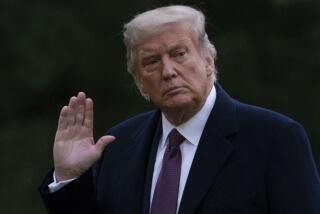Bureaucrats’ Work to Be Tested; Demotions Possible : China to Stress Merit in New Civil Service Setup
- Share via
BEIJING — China will soon issue regulations to create a civil service system based on merit, its official news agency reported Monday.
The new rules will first be implemented on a trial basis in some central government ministries and in provinces and cities across the country, the New China News Agency said.
The State Council--China’s equivalent of a Cabinet--will create an agency to oversee the system, and colleges of administration will be set up to train candidates, the news agency reported.
A call for such a system was a major point in the keynote speech of General Secretary Zhao Ziyang at a recently concluded Communist Party congress.
After nearly four decades during which political considerations and arbitrary decision-making dominated the government’s personnel policies, creation of a civil service system based on merit would represent a partial return to centuries-old traditions.
Begun During Han Dynasty
China’s first imperial university to train government officials was established under the Han Dynasty in 124 BC, and the use of examinations to select some bureaucrats dates from that period.
It was about 1,300 years ago, during the Tang Dynasty, that a highly refined civil service system based on the study of classical texts assumed central importance in China’s system of government.
“The examination system . . . gave to China the world’s first educated bureaucracy chosen fundamentally on the basis of merit,” Harvard University Professors Edwin O. Reischauer and John K. Fairbank wrote in their text, “East Asia, the Great Tradition.”
China’s leaders now envision a new meritocratic system that would contribute to modernization.
Applicants for civil service posts “will have to pass a statutory examination in open competition,” the New China News Agency reported.
“Explicit legal stipulations will govern their rights, duties and terms of employment,” the agency said. “Morality, capability and diligence will count in their work assessment. Public servants at leading posts will be demoted or removed if checks on their work prove that they are incompetent. Wages of civil servants will also be decided mainly on their duties and contribution, while seniority, educational background and regional differences will all be considered.”
The bureaucratic problems that a civil service system is meant to attack are immense.
China’s top leader, Deng Xiaoping, described these problems in a 1980 speech that was republished with great fanfare earlier this year.
In the speech, which provided much of the theoretical underpinning for the reformist policies endorsed by the party congress, Deng declared that the “harmful manifestations” of bureaucracy had reached “intolerable dimensions.”
The New China News Agency, in a June 30 report, summarized Deng’s list of abuses: “Standing high above the masses, abusing power, divorcing oneself from reality and the masses, indulging in empty talk, sticking to a rigid way of thinking, being hidebound by convention, overstaffing administrative organs, being dilatory, inefficient and irresponsible, reprimanding others at every turn, suppressing democracy, practicing favoritism, offering bribes and participating in corrupt practices in violation of the law.”
Deng said in his speech that one cause of these problems was that China has “no regular methods for recruiting, rewarding and punishing cadres, or for their retirement, resignation or removal.”
“Whether they do their work well or poorly, they have ‘iron rice bowls,’ ” Deng said. “They can be employed but not dismissed, promoted but not demoted.”
Together with new standards of competence for professional civil service employees, new policies also will be established for a separate category of political appointees, the New China News Agency reported Monday. They will only serve for limited terms.
The agency quoted an unidentified senior official who said that the work of creating a civil service system will be coordinated with changes aimed at “separating the functions of the party and government.”
More to Read
Sign up for Essential California
The most important California stories and recommendations in your inbox every morning.
You may occasionally receive promotional content from the Los Angeles Times.








